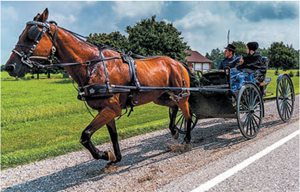Mennonite pioneers on the Grand River

Their faith is reflected in the many churches of Mennonite origin in Waterloo region. PHOTO: DANIEL AVRAM
Visitors to the cities of Kitchener and Waterloo in southern Ontario are often mystified by the roads. In southern Ontario major roads typically follow an orderly grid pattern. Not so in Waterloo Region. Here they wind back and forth and change direction unexpectedly. Ostensibly parallel roads intersect each other multiple times.
What explains these unruly roads? The answer oddly enough is Mennonites.
They came to the Grand River Valley in 1800 from Pennsylvania, where their Swiss and German ancestors had settled over the previous century in search of religious freedom and exemption from military service. Like other Anabaptist groups Mennonites believed that fully following Jesus required pacifism as well as a life of simplicity and separation from the world.
Hardworking Mennonites had prospered in Pennsylvania, but events around the American War of Independence from Britain made some of them uneasy. The pacifist stance became unpopular — and expensive, as the state imposed heavy taxes on those who would not bear arms.
To the north the British government of Upper Canada (Ontario) was enticing settlers, so some Mennonites began to cross the border in the 1780s in search of cheap farmland and more freedom. Some of them found their way to the Grand River Valley.
The valley was inhabited seasonally by the Mississaugas but had recently been granted to the Six Nations (Haudenosaunee) Confederacy as a reward for siding with the British in the Revolutionary War. Joseph Brant (Thayendanegea), leader of the Six Nations, intended to sell much of this land for settlement, including a block corresponding to modern-day Kitchener-Waterloo which he sold to investor Richard Beasley. (Disputes about the grant and the sales continue to this day.)
To pay off his mortgage Beasley needed to sell the land to settlers. This is where the Mennonites come in.
With the approval of both the government and of Brant, who judged the Mennonites to be an "honest, industrious people," Beasley sold 60,000 acres as a single block to a group of Pennsylvania Mennonites organized as the "German Company." They paid £10,000.
Pioneering life was not easy. The journey from southeastern Pennsylvania to the Grand River took six to ten weeks of travel in covered Conestoga wagons. Nothing could be grown until the forest was cleared. Many families lost children to fever and fathers to falling trees.
Pioneer church services took place in homes or barns. Services included the singing of hymns (each line had to be read out first by the minister because not everyone had hymnals), the reading of Scripture, one or two sermons, the Lord’s Prayer and a benediction.
The Mennonite pioneers left an enduring stamp on Waterloo Region, as they did on parts of Manitoba and Saskatchewan.
Many of their descendants still live in the Waterloo area, and the phone books are full of names from those early years such as Bechtel, Erb, Schneider and Schwartzentruber. Their German language attracted many later immigrants from German-speaking lands, making the area the largest centre of German language and culture in eastern Canada.
Their tradition of simplicity and separation is carried on by Old Order and Amish groups with their horse-drawn buggies. Their faith is also reflected in the many churches of Mennonite origin, including offshoots such as Mennonite Brethren, Brethren in Christ, and Evangelical Missionary churches.
The motto of Waterloo Region, "Peace, Prosperity," is a fitting summary of their values and accomplishments.
But what about the roads? In most parts of Ontario the land was sold in rectangular lots leaving space for roads. But most of what is now Kitchener-Waterloo was bought as a single block by the German Company and divided up without road allowances. Many of the roads developed organically over time along old Indigenous trails or convenient shortcuts to mills or waterways.
If you ever find yourself in Waterloo Region, bemused as your road takes an unexpected turn, remember that you may be retracing the footsteps of a Mennonite pioneer.

Kevin Flatt is associate professor of history and director of research at Redeemer University College in Ancaster, Ont. Read more at www.FaithToday.ca/HistoryLesson